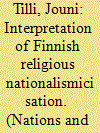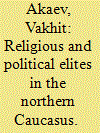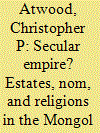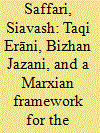| Srl | Item |
| 1 |
ID:
090692


|
|
|
|
|
| Publication |
2009.
|
| Summary/Abstract |
The topic of this article is the relation between 'politicality' and theology in the discourse of Finnish religious nationalism during the Winter War of 1939-40 and the Continuation War of 1941-44. I shall draw on the ideas of Kari Palonen and Anthony D. Smith in attempting to thematise theological depoliticisation as an intrinsic element of religious nationalism. Also, I will elaborate its political significance in the Finnish context, where the role of traditional religion in the general development of nationalist thought has been particularly important. The specific focus is on how prominent representatives of the Finnish clergy related to war and nationalist claims in general. My interpretation is that their arguments were drawn from what I call the topoi of theological depoliticisation, which, at the same time, rendered the discourse extremely political.
|
|
|
|
|
|
|
|
|
|
|
|
|
|
|
|
| 2 |
ID:
134120


|
|
|
|
|
| Publication |
2014.
|
| Summary/Abstract |
This article highlights the main factors relating to the formation of the religious and political (Islamic) elites in the Northern Caucasus caused by Gorbachev's perestroika, the collapse of the Soviet Union, the reforms conducted in Russia, the creation of an ideological vacuum, and the birth of market relations. The sociocultural context that formed has given rise to an Islamic revival, the penetration of Salafi (Wahhabi) ideas into the region, and the formation of a neo-clergy that is not only claiming a leading role in the religious life of Muslims, but also active participation in politics, right down to preparing a state coup.
|
|
|
|
|
|
|
|
|
|
|
|
|
|
|
|
| 3 |
ID:
184154


|
|
|
|
|
| Summary/Abstract |
Recent work in religious studies has emphasized how European colonial empires used the defining and constructing of religions and secularism as tools of rule. This article explores parallel processes in the Mongol empire (1206–1368) where ‘religion-making’ occurred in three areas: 1) a precise and legal definition of professional service estates among the conquered peoples that included the clergies of designated religions; 2) a broad and imprecise classification of nom or ‘way of life’ that partially overlapped with the clergies defined in the first category; and 3) a realm above all such sectarian distinctions destined for the Mongol ruling elite who alone were capable of living in free obedience to Heaven. The parallels and differences with classifications of the religious and the secular in European colonial empires shed light on how power interacts with cultural classification and practices.
|
|
|
|
|
|
|
|
|
|
|
|
|
|
|
|
| 4 |
ID:
180021


|
|
|
|
|
| Summary/Abstract |
This article examines the development of a Marxian frame for the critique of religion in twentieth century Iranian political thought by Taqi Erāni and Bizhan Jazani. It argues that, following Marx, Erāni and Jazani understand religion to be a superstructural relic from an earlier stage of human development which will gradually and inevitably withdraw from collective human life as a consequence of the material dialectics of history. It further shows that Erāni and Jazani consider religion to be instrumental in sustaining relations of oppression, and they view with skepticism attempts to reform religion or to use religious faith as an instrument for mass mobilization in revolutionary struggles.
|
|
|
|
|
|
|
|
|
|
|
|
|
|
|
|